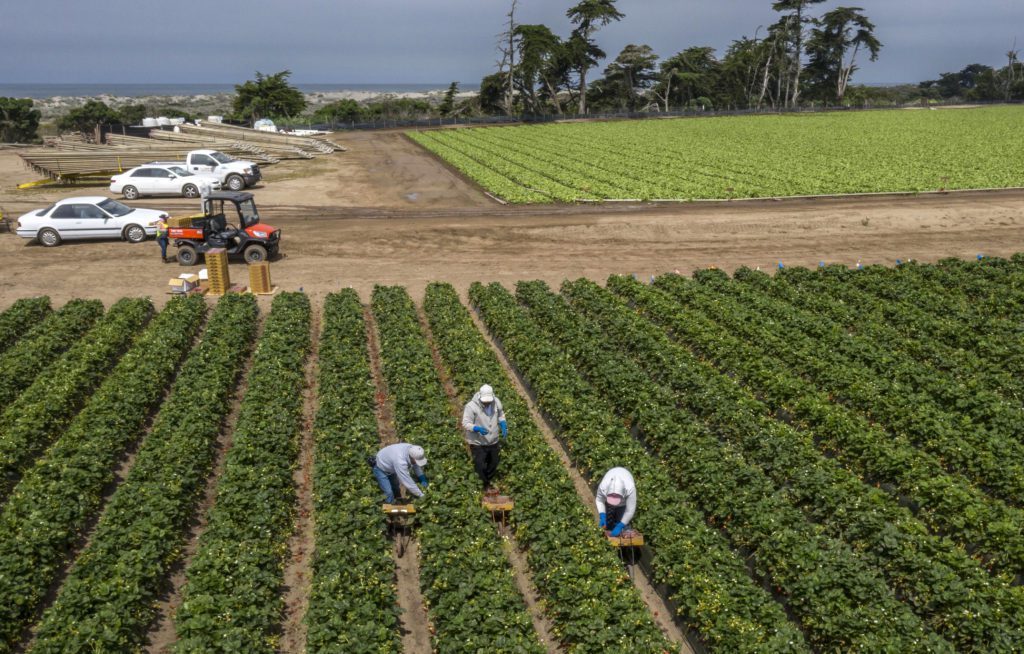Dec 22, 2021Wage rules change as ag faces host of new state laws in California
Farmers and ranchers will find themselves subject to new laws in 2022 that will raise wages, redefine animals’ living arrangements and allow ranchers better access to livestock in evacuation zones.
Effective Jan. 1, California’s minimum wage rises to $15 per hour for employers with 26 or more employees at any time in a pay period. Those employing 25 or fewer people at all times in a pay period will see the minimum wage rise to $14 per hour in 2022 and to $15 in 2023.
Employers of 26 or more people will also owe overtime pay to agricultural employees after working eight hours in a workday or 40 hours in a workweek. Those employees will be owed time and a half for work after eight and up to 12 hours in a day, and double time after 12 hours.
For the first time, employers of 25 or fewer people will be subject to the law phasing in lower overtime thresholds for agricultural employees. Those smaller employers will owe them overtime pay after 9½ hours worked in a workday or 55 hours in a workweek. The overtime limits will ratchet down over the next few years for smaller employers until they reach eight hours in a workday or 40 in a workweek, plus double time after 12 hours in a workday, on Jan. 1, 2025.
The overtime changes are the result of Assembly Bill 1066, authored by Assemblywoman Lorena Gonzalez, D-San Diego, and enacted in 2016.
The state also is making changes to cannabis regulation. The California Department of Food and Agriculture had been sharing responsibility for regulating cannabis with the Department of Consumer Affairs and the Department of Public Health. A new Department of Cannabis Control will now be in charge.
This change will affect agriculture’s relationship with marijuana growers, said Taylor Roschen, a California Farm Bureau policy advocate. When CDFA had a role, she said, “we were able to share the challenges of the ag sector and its relationship with cannabis with an audience that understood the ag components of it,” such as “pesticide use, or right to farm, or water availability and weed control.”
“It’s going to be interesting to see as things transition over to a new agency that doesn’t really have agriculture as part of its charge, whether or not they’ll be welcoming the questions about how conventional agriculture and cannabis work together and conflict,” Roschen said.
Livestock producers in California will see more limits on animal housing as a result of Proposition 12, which passed with nearly 63% of the vote in 2018.
As of Jan. 1, Proposition 12 will require breeding pigs and their offspring to have at least 24 square feet of space per pig. Egg-laying hens must be in cage-free housing, whether indoors or out, that meets guidelines set by the United Egg Producers in 2017. The guidelines define cage-free housing as 1 to 1½ square feet of usable floor space per hen and allowing hens to move around.
The proposition also bans the sale of veal from calves, pork from breeding pigs, and eggs from hens whose housing doesn’t meet the proposition’s minimum standards. A coalition of restaurant groups and chambers of commerce have sued, asking for a delay in enforcement due to a lack of rule-making by the state.
Farm Bureau policy advocate Katie Little submitted comments to CDFA concerning the proposition’s effects on students in 4-H, FFA and similar educational programs. Little noted the proposition states it “shall not apply … during rodeo exhibitions, state or county fair exhibitions, 4-H programs and similar exhibitions.”
Little said agricultural groups had reached out with concerns about buyers of such animals having to abide by Proposition 12.
“We have provided comments to urge the clarification, and ultimate exemption, of Prop. 12 for 4-H and similar agricultural education programs,” Little said. “These programs are a gateway for many into the agricultural industry. But, if processors are unable to process these custom animals, this niche market could ultimately fade away.”
Under a Farm Bureau-sponsored bill, livestock producers will have expanded access to mobile slaughter operations. AB 888 by Assemblyman Marc Levine, D-Marin, allows mobile slaughter operators to handle sheep, goats, pigs and cattle on private ranches. Meat processed in such fashion cannot be sold commercially under the law.
Little said she’s interested in hearing from ranchers on how the law is working and whether changes are needed.
“We want to make sure that we keep those costs down, and so we’ll work through the regulatory process to make sure that that stays accessible,” Little said.
Farmers and ranchers who need to check on livestock during evacuations prompted by wildfires and other disasters will have an easier time doing so thanks to AB 1103 by Assemblywoman Megan Dahle, R-Bieber. The law sets up an Ag Pass program allowing ranchers to get through road closures to look after their animals and evacuate them if necessary.
Those engaged in prescribed burns intended to reduce fuel loads will have some liability protection with the enactment of Senate Bill 332 by Sen. Bill Dodd, D-Napa. The law provides that “burn bosses” will not be liable for fire-suppression costs arising from prescribed burns that get away, provided that the burn’s objective is wildland fuel reduction or ecological maintenance and restoration, and gross negligence is not involved.
– Kevin Hecteman, California Farm Bureau Federation















